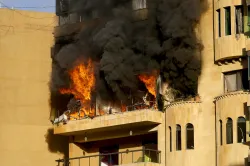India's first reaction after Iran attacks Israel: 'Conflict shouldn't take wider regional dimension'
In a statement, the Ministry of External Affairs urged both parties to restrain attacking each other and asked to return to dialogue and diplomacy in order to avoid wider conflict in the region.

Amid the escalating situation in the Middle East, India on Wednesday, expressed grave concerns over the recent attack carried out by Iran on Israel. In a statement, the Ministry of External Affairs urged both parties to restrain attacking each other and asked to return to dialogue and diplomacy in order to avoid wider conflict in the region.
"We are deeply concerned at the escalation of the security situation in West Asia and reiterate our call for restraint by all concerned and the protection of civilians," MEA said. "It is important that the conflict doesn’t take a wider regional dimension and we urge that all issues be addressed through dialogue and diplomacy," it added.
Earlier on Tuesday, Tehran launched a salvo of missiles against Israel in retaliation for the killing of several leaders of Iran-aligned armed groups.
Israeli Prime Minister Benjamin Netanyahu said Iran's missile attack on Israel failed and vowed retaliation, at the start of a security meeting in Tel Aviv on Tuesday night (October 1). "Iran made a big mistake tonight - and it will pay for it," he said. "The regime in Iran does not understand our determination to defend ourselves and our determination to retaliate against our enemies."
Iran's Revolutionary Guard Corps said the assault was in retaliation for recent Israeli killings of militant leaders and aggression in Lebanon and Gaza. Its forces used hypersonic Fattah missiles for the first time, and 90% of its missiles successfully hit their targets in Israel, the Revolutionary Guards said.
No injuries were reported in Israel, but one man was killed in the occupied West Bank, authorities there said.
Why did Iran launch missiles toward Israel?
Israel’s military said it identified 180 missiles launched from Iran shortly after 7:30 p.m. Sirens blared across the country, and Israelis were ordered to stay in protected areas. An Israeli security official said that in cooperation with the United States, the Israeli Air Force intercepted many of the missiles, though there were some direct hits damaging buildings and igniting some fires.
US and British officials later said approximately 200 missiles had been launched by Iran.
Iran said the missiles were in response to the killing of Hezbollah leader Hassan Nasrallah and Revolutionary Guard Gen. Abbas Nilforushan, both killed in an Israeli airstrike last week in Beirut. It also mentioned Ismail Haniyeh, a top leader in Hamas who was assassinated in Tehran in a suspected Israeli attack in July. It warned this attack represented only a “first wave,” without elaborating.
(With inputs from agencies)
ALSO READ: Israel, Jordan and Iraq close airspace as Iran launches barrage of missiles in major escalation